We go through a lot of olive oil in our house. As big fans of fats, we use the good green stuff for dressings, dips, sautéing and baking, and even to clear cradle cap on newborns! Olive oil is extremely versatile, but not all olive oil is created sustainably. Here are my picks for the best eco-friendly olive oil, plus tips on choosing olive oil that’s healthy for you and the planet.
It’s a confusing business to choose olive oil in the grocery store. How can you choose olive oil that is both delicious and sustainable?
First, know that olives and olive oil are inherently more eco-friendly than a lot of other fats. They require a lot less energy and water (about half that of almonds!) to grow, and you don’t have to refrigerate them or use cold-chain transport.
Second, unlike animal fats, olive oil doesn’t have massive amounts of associated methane emissions or inefficient nutrient conversion.
Finally, olive oil is mechanically (naturally) extracted rather than chemically extracted using solvents that can be harmful to the environment.
Olive oil is inherently more eco-friendly than a lot of other fats.
Top picks
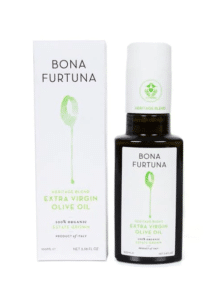
Bona Furtuna Extra Virgin Olive Oil
Highlights: Award-winning extra virgin olive oil freshly bottled on the estate within 24 hours. Made from handpicked, heritage olive varietals nurtured by a Sicilian B Corp and 1% for the Planet member.
- Certified B Corps
- 1% for the planet member
- Grown organically, harvest waste used in sustainable ways
- The company strives to save heirloom olive varieties
- Subscription model available
- Pricey
- Hard to find in stores (but available in Jackson, WY)
Olive oil doesn’t get much more sustainable than Bona Furtuna. The company is a freshly minted (January 2022) B Corporation and 1% for the Planet member. Its operations are located within a bio-preserve in the Sicani Mountain region of Sicily. Bona Furtuna uses exclusively organic practices to nurture more than 12,000 olive trees, some up to 1,500 years old.
The entire farm is certified organic, with a focus on permaculture practices and the promotion of biodiversity. The company uses olive oil harvest waste to nurture the soil, polyculture with crop rotation, pollinator-friendly planting, and has free-roaming animals across the estate. The La Furtuna Estate is fed by spring waters flowing from Mt. Barraù, and the company uses solar energy to power farming operations.
The company’s master botanist rediscovered and helped propagate an ancient olive varietal, the Biancolilla Centinara (meaning “ancient white lilac”). Through a partnership with Slow Food’s Sicilian chapter, the company helped to plant 400 rare, heirloom olive trees throughout the region and plans to plant 1,000 more in 2022. Bona Furtuna also helped develop community gardens and engaged in youth education. It is clearly committed to supporting local job creation and the local economy to preserve Sicilian culture.
Bona Futura has planted 1,500+ rare heirloom olive trees throughout a bio-preserve in Sicily.
The company won three gold medals at the 2021 EVO IOOC (International Olive Oil Contest) along with numerous other awards. Its Heritage Blend is a fully organic, single-estate olive oil created from olives from trees up to 1,000 years old. Ideal for salad, pasta, fresh-baked bread, and more, this premium EVOO is bottled on the estate within 24 hours of the olive harvest. The farmers handpick the olives, mill them mechanically, and cold-extract the oil without solvents.
Bona Furtuna offers a subscribe and save (10%) option – you need never run out of delicious sustainable olive oil again!
LeafScore is based in Jackson, WY, a city where, believe it or not, Bona Furtuna has a big presence. Several local stores in Jackson carry Bona Furtuna, and the company hosted a pizza-making event at this year’s Farm to Fork Festival, put on by Slow Food in the Tetons. We were able to sample olive oil and balsamic from Bona Furtuna, and learn more about their sustainability practices first-hand from members of the Bona Furtuna team.
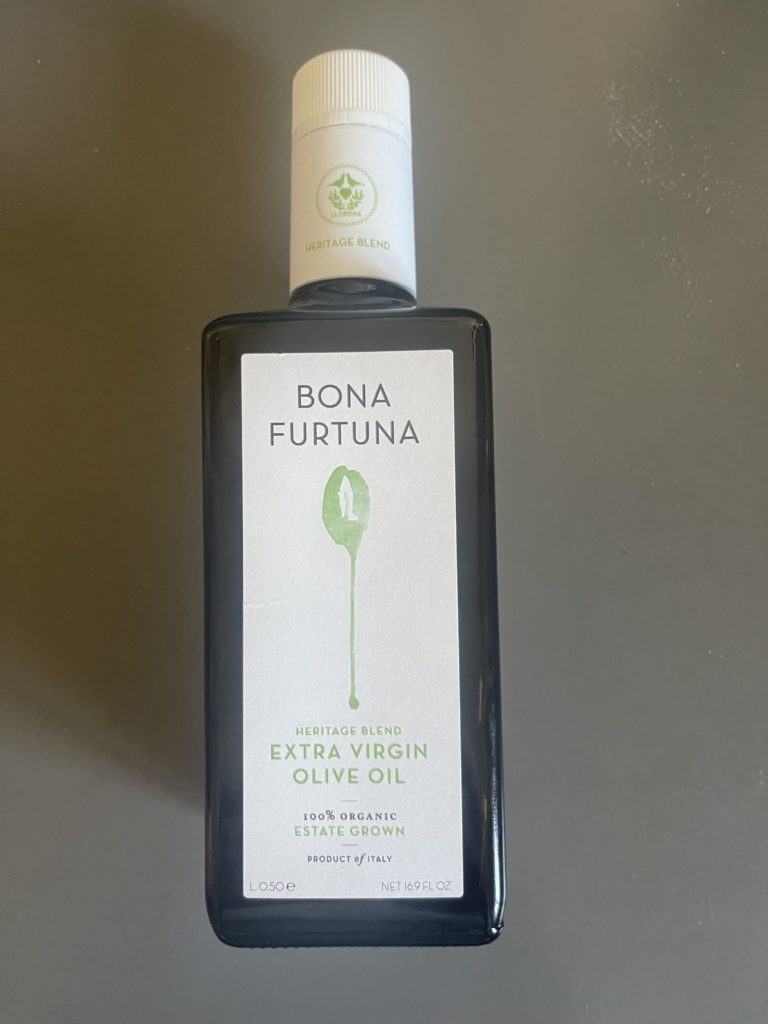
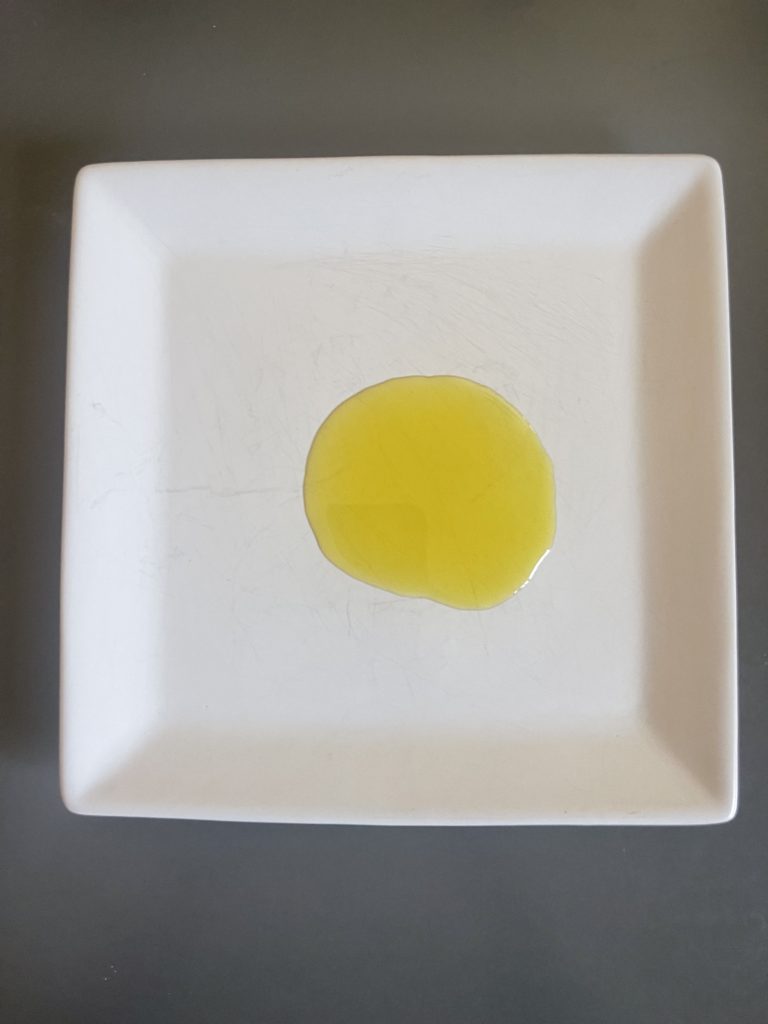
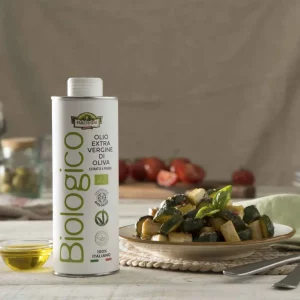
Farchioni Biologici Extra Virgin Olive Oil
Highlights: Sustainable company with a circular economy approach, producing certified organic olive oil in Italy within 24 hours of harvest.
- Certified organic
- Processed within 24 hours of harvesting
- Centuries-old brand
- Expensive to ship
Farchioni EVOO comes from organic olives grown and processed using cold extraction in Italy within 24 hours of harvesting. The EVOO is fruity, bitter, light, and a touch spicy with an emerald green color. Farchioni processes the olive oil entirely in Italy, and the oil carries organic certification from the Institute for Ethical and Environmental Certification (ICEA).
The Farchioni family has been making food and beverage products since 1780 and specializes in olive oil, wine, beer, and flour. The products all originate in Umbria, with a fully controlled supply chain and a focus on environmental and social sustainability.
Farchioni EVOO comes from organic olives grown in Italy and cold extracted within within 24 hours of harvesting.
The company practices ‘peasant sustainability’ and ‘open self-sufficiency.’ This means it tries to be zero-waste and nurtures a holistic ecosystem while producing quality food for sale. Farchioni is very open about its approach, including the ways it uses animal and agricultural waste to nourish the soil and considers all life cycle stages when packaging products.
The company published its first substantial and audited sustainability report in 2020 in accordance with best practices through the Global Reporting Initiative. In 2020 it also began to assess where company practices line up with the United Nations Sustainability Development Goals (SDGs), creating opportunities for improvement going forward.
This reporting found no potential negative impacts on global sustainability as a result of Farchioni’s activities. Indeed, Farchioni’s approach maximizes regeneration within a circular economy, offering consumers outside the circle the finished product in streamlined packaging.
Farchioni does ship to the US, but it’s quite expensive. As such, I’d recommend buying in bulk along with neighbors, friends, and/or family.
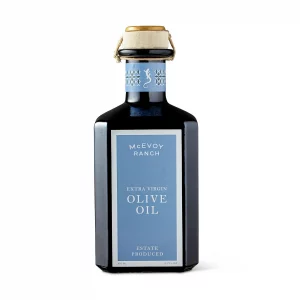
McEvoy Ranch Organic Olive Oil
Highlights: Organic olive oil from olives grown, milled, and bottled in California as part of a huge organic ranch.
- Grown in the USA, California
- USDA certified organic
- Tours and tasting rooms available on-site
- First certified B-Corps olive oil producer in the world
- Certified B-Corps status has lapsed.
McEvoy Ranch is a huge organic ranch in Petaluma, California. It began with olive oil and now produces wine, skincare products, and CBD too. All the oils are certified organic by California Certified Organic Farmers (CCOF). Milling, blending, and bottling all happen on-ranch.
McEvoy Ranch offers an Organic Traditional Blend of seven Italian olive varietals as well as Olio Nuovo, which is only available for a few months after each autumn’s harvest. They bottle the oil right away without filtering. The oil is peppery, rich, and vibrant green. McEvoy also releases a Limited Edition reserve oil in late spring. This is a blend of that season’s harvest, which could include Frantoio, Leccino, Pendolino, Moraiolo, Maurino, Coratina, and Leccio del Corno varietals.
Olio Nuovo is bottled without filtering. The oil is peppery, rich, and vibrant green.
The company is a member of the Olive Oil Commission of California (OOCC) and the Extra Virgin Alliance (EVA), a worldwide olive oil producers’ group. It uses organic farming as a baseline and strives to create a self-sufficient, balanced agricultural ecosystem. This means embracing local flora and fauna, minimizing off-ranch waste, and reducing water consumption using drip irrigation from rain-fed, surface-run-off ponds instead of groundwater. The farmers also turn olive oil harvest waste and water into compost and mix this with livestock manure.
McEvoy also uses a traditional Agrumato process to produce flavored oils where fruit or herbs are co-milled with the olives. The ranch offers tours and tasting room visits. For most American customers, this California olive ranch is a more sustainable choice than importing oil from Europe or elsewhere.
McEvoy Ranch has been farming organically since the 1990s. It was the first certified B Corp olive oil producer in the world (in 2014), but the company’s B Corp status has lapsed.
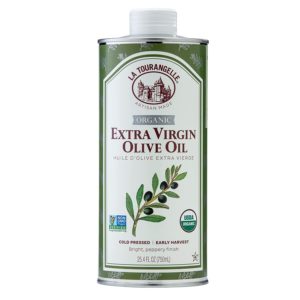
La Tourangelle Organic Extra Virgin Olive Oil
Highlights: Artisanal organic olive oil from Sicily, grown as part of a co-op and packaged in a recyclable tin.
- Made in California
- Part of a multi-family cooperative
- High in polyphenol antioxidants
- Packaged in recyclable, BPA-free containers
- High antioxidant content may affect the flavor for some users
La Tourangelle is a small French artisan oil maker who set up a branch in California in 2002. The family-owned company sent a hydraulic press, cast iron roasting kettles, and one of its own, Matthieu Kohlmeyer, to oversee operations.
La Tourangelle Organic Extra Virgin Olive Oil is a USDA Organic cold-pressed oil made from Picual olives from Spain. According to the company, the oil has “hints of freshly cut grass, almond, fresh olive leaves and a bright peppery finish.” The oil is the result of early-season harvesting in Andalusia, Spain.
Specifically, these olives grow in Puente de Genave, a region of the Natural Park of the Sierra de Segura in Spain. Many families own the trees as a cooperative. This ensures that profits from the olives support the local community. It also encourages all owners to continue with their organic, traditional form of agriculture.
This oil is high in polyphenol antioxidants and oleic acid, by dint of the olives growing in a mountainous area where the trees experience some natural stress. The oil may be more stable due to this high antioxidant content.
The company’s products are all non-GMO certified and packaged in BPA-free food-grade tins. These tins are recyclable and help prevent oxidation and light exposure. La Tourangelle offers a subscription service and one-time purchases.
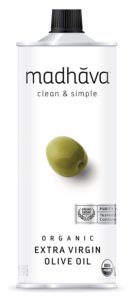
Madhava Organic Olive Oil
Highlights: Traceable, organic, single-source EVOO from Tunisian olives and packed in BPA-free tin in Italy.
- US-based business
- USDA organic certified
- Sold in BPA-free containers
- Primarily a honey company, not an olive oil producer
- Olives not grown in the US (grown in Tunisia, processed in Sicily.
Madhava is a honey company that got its start in 1973 in Colorado. It now offers honey, agave, olive oil, and other products. The brand has won several awards from the Clean Label Project for high purity standards and high antioxidant content. The products are third-party tested and free of pesticides and around 130 other potentially hazardous contaminants.
Madhava packs all products in BPA-free containers. Its organic olive oil comes in a one-liter tin. This oil is traceable, cold-extracted, non-GMO, and extra-virgin. It is USDA Organic certified and made using olives from a single source in Tunisia with packing in Sicily.
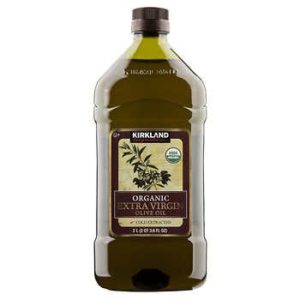
Kirkland Organic Extra Virgin Olive Oil
Highlights: Readily available, affordable, organic extra virgin olive oil blend packed in plastic.
- Large quantity, cost-effective
- Produced in Italy, Portugal and Spain
- Stored in plastic
- May go bad quickly
Kirkland Signature’s Organic Extra Virgin Olive Oil is packaged in a dark plastic two-liter container for a very affordable price. While you’re not likely to use this as a fancy dipping oil, it works well for cooking and baking.
The oil is certified organic and comes from olives from Italy, Portugal, and Spain. It is the first cold-pressed oil from these olives and is a good choice if you tend to use a lot of olive oil. Given the plastic container, though, I wouldn’t buy this if it takes your household more than a few weeks to get through two liters of oil. And you’ll definitely want to store the oil in a cool, dark place.
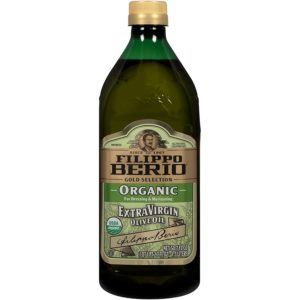
Filippo Berio Organic Extra Virgin Olive Oil
Highlights: A readily available brand of organic EVOO now packaged in plastic instead of glass.
- USDA-certified organic
- Well-established brand
- Cost-effective
- Packaged in plastic, it may go bad more quickly
Filippo Berio is a widely available brand at many grocery stores and produces both organic and non-organic olive oil. The labels look very similar, so check twice before buying!
The Filipo Berio USDA Organic certified EVOO is made using the first cold pressing of olives. This EVOO has a medium fruity flavor with almond and green tomato notes.
The brand has been around for some 150 years and used to be my go-to for grocery store olive oil. Unfortunately, Filippo Berio has stopped using glass bottles for its oils. Instead, it now uses PET bottles that are BPA-free. The company explained the switch as a result of data showing that the plastic is fully recyclable and requires 60% less energy to make compared to glass. Plastic bottles also weigh less than glass, making for a reduction in transport-associated energy use. These plastic bottles may also be easier and safer for some customers, and workers, to handle.
Switching to plastic may have benefits: it’s lighter (so takes less fuel to ship) and is easy for workers to handle.
While I used to regularly buy Organic extra virgin olive oil from Filippo Berio, I stopped when they switched to plastic bottles. It’s still likely much better than most other brands, but I’d avoid any oil on the top shelf of a store or that is close to expiry.